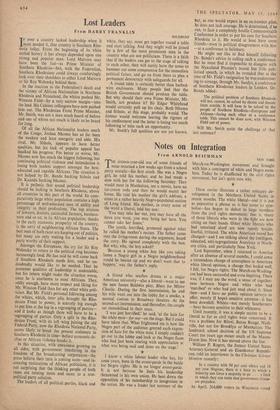Lost Leaders
From HARRY FRANKLIN
SALISBURY
I F ever a country lacked leadership when it
most needed it, that country is Southern Rho- desia today. From the beginning of its white settled history it has always depended upon one strong and popular man. Lord Malvern may have been the last—as Prime Minister of Southern Rhodesia—but, with the Federation, Southern Rhodesians could always comfortingly look over their shoulders to either Lord Malvern or Sir Roy Welensky behind them.
In the reaction to the Federation's death and the victory of African Nationalism in Northern Rhodesia and Nyasaland, the whites pushed Mr. Winston Field—by a very narrow margin—into the lead. His Cabinet colleagues have now pushed him out. The Rhodesian Front Prime Minister, Mr. Smith, was not a man much heard of before and one of whom not much is likely to be heard for long.
Of all the African Nationalist leaders south of the Congo, Joshua Nkomo has so far been the weakest and least energetic and able. His rival, Mr. Sithole, appears to have better qualities, but his lack of popular appeal has baulked his progress. For better or worse, Mr. Nkomo now has much the biggest following, but continuing political violence and intimidation is losing both leaders support amongst the best- educated and capable Africans. The situation is not helped by Dr. Banda backing Sithole and Dr. Kaunda backing Nkomo.
It is pathetic that sound political leadership should be lacking in Southern Rhodesia, above all countries in this part of the world. Its com- paratively large white population contains a high percentage of well-educated men of ability and integrity in their professions. The top stratum of lawyers, doctors, successful farmers, business- men and so on, in its African population, thanks to the early economic prosperity of the country, is the envy of neighbouring African States. The best men of both races are keeping out of politics, but many are only waiting for a leader and a party worthy of their support.
Amongst the Europeans, the cry for Sir Roy Welensky to return to the political ring becomes increasingly loud. He has said he will come back if Southern Rhodesia needs him, and he un- doubtedly would like to be needed. That he possesses qualities of leadership is undeniable, but his return might make the situation worse, since he is anathema to most Africans. They, oddly enough, have more respect and liking for Mr. Winston Field than for any other white poli- tician. But Mr. Field's personal following among the whites, which, inter alio, brought the Rho- desian Front to power, is scarcely big enough to put him at the top in a regrouping of parties— and it looks as though there will have to be a regrouping of parties. Only a split in the Rho- desian Front, with its left wing joining the old Federal Party, now the Rhodesia National Party, seems likely to break the present stalemate in Southern Rhodesia in time—before economic de- cline or African violence breaks it.
In this situation, with uneasiness growing on all sides, with government interfering in the freedom of the broadcasting corporation—the press believe their turn is coming soon—and in- creasing rustications of African politicians, it is not surprising that the thinking people of both races are turning more and more to a non- political party solution.
The- leaders of all political parties, black and
white, they say, must get together round a table and start talking. And they might well be joined by a few of the most prominent men in the country who are not politicians. There is a faith that if the leaders can get to the stage of talking to each other, they will surely have the sense to hammer out some compromise for the immediate political future, and go on from there to plan a permanent democracy with safeguards for all.
A round table is certainly better than barbed- wire enclosures. Many people feel that the British Government should produce the table. But why should their own Prime Minister, Mr. Smith, not produce it? Sir Edgar Whitehead would certainly pull up his chair. Both Nkomo and Sithole, at this stage, probably would. The former would welcome leaving the rigours of his confinement and the latter is losing too much following to- miss such an opportunity.
Mr. Smith's full qualities are not yet known, but, as one would expect in an ex-bomber pilot, he does not lack courage. He is determined, if he can, to face a completely hostile Commonwealth Conference in order to put his case for Southern Rhodesia to it. He would at least have some friends—even in political disagreement with him —at a conference in Salisbury.
He might not like to find himself following Dr. Banda's advice in calling such a conference. But he must find it impossible to disagree with the Nyasaland Premier's recent but little pub- licised speech, in which he revealed that at the time of Mr. Field's resignation he was endeavour- ing to arrange, through Mr. Sandys, a conference of Southern Rhodesian leaders in London. Dr. Banda added: The political problem of Southern Rhodesia will not, cannot, be solved by shouts and threats from outside. It will have to be solved by the people of Southern Rhodesia—Europeans and Africans—facing each other at a conference table. This cannot be done now, with Winston Field out of power.
Will Mr. Smith resist the challenge of that last sentence?






























 Previous page
Previous page